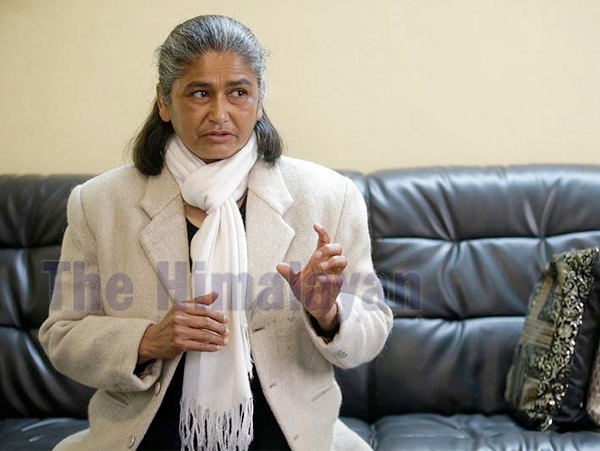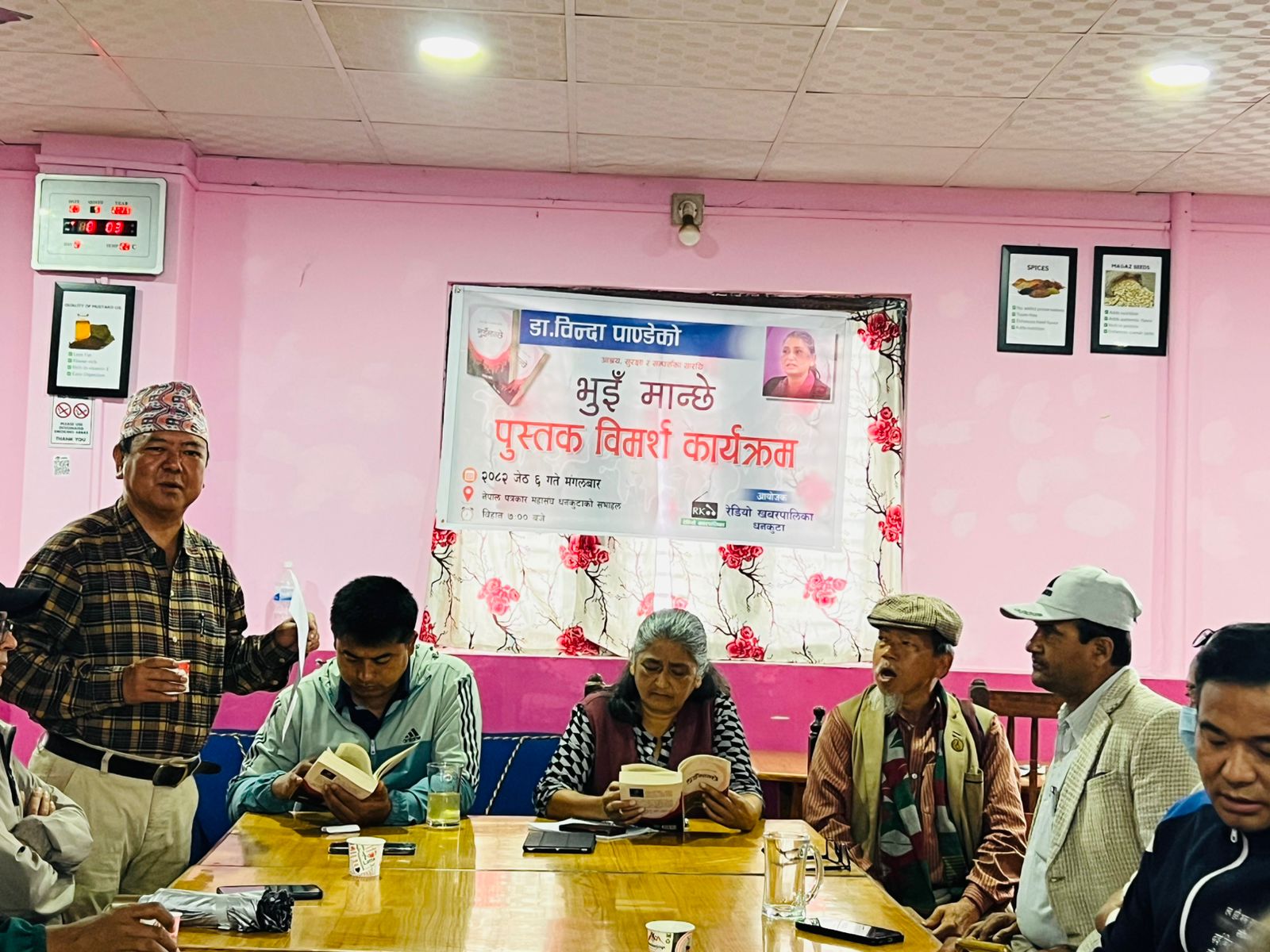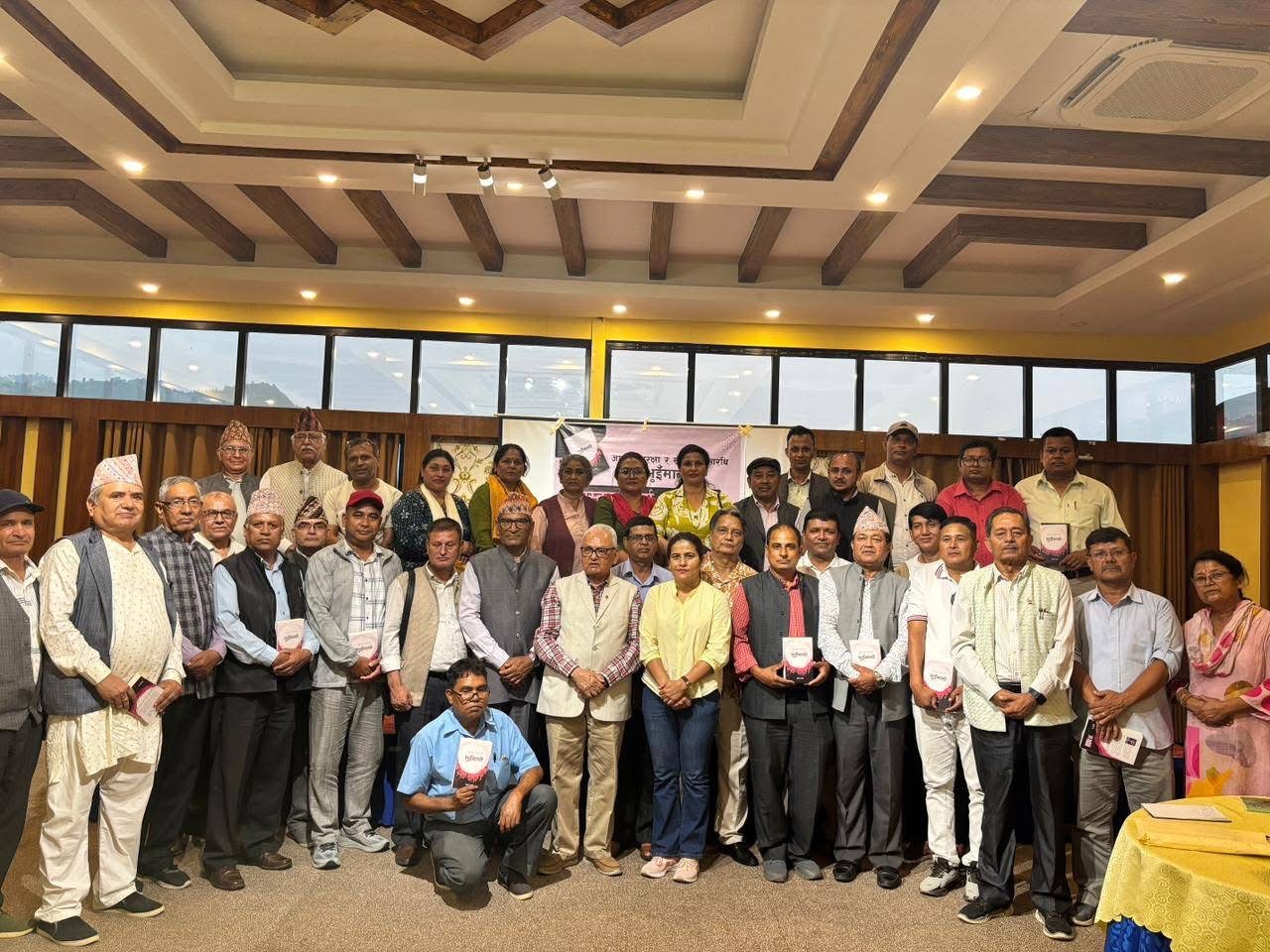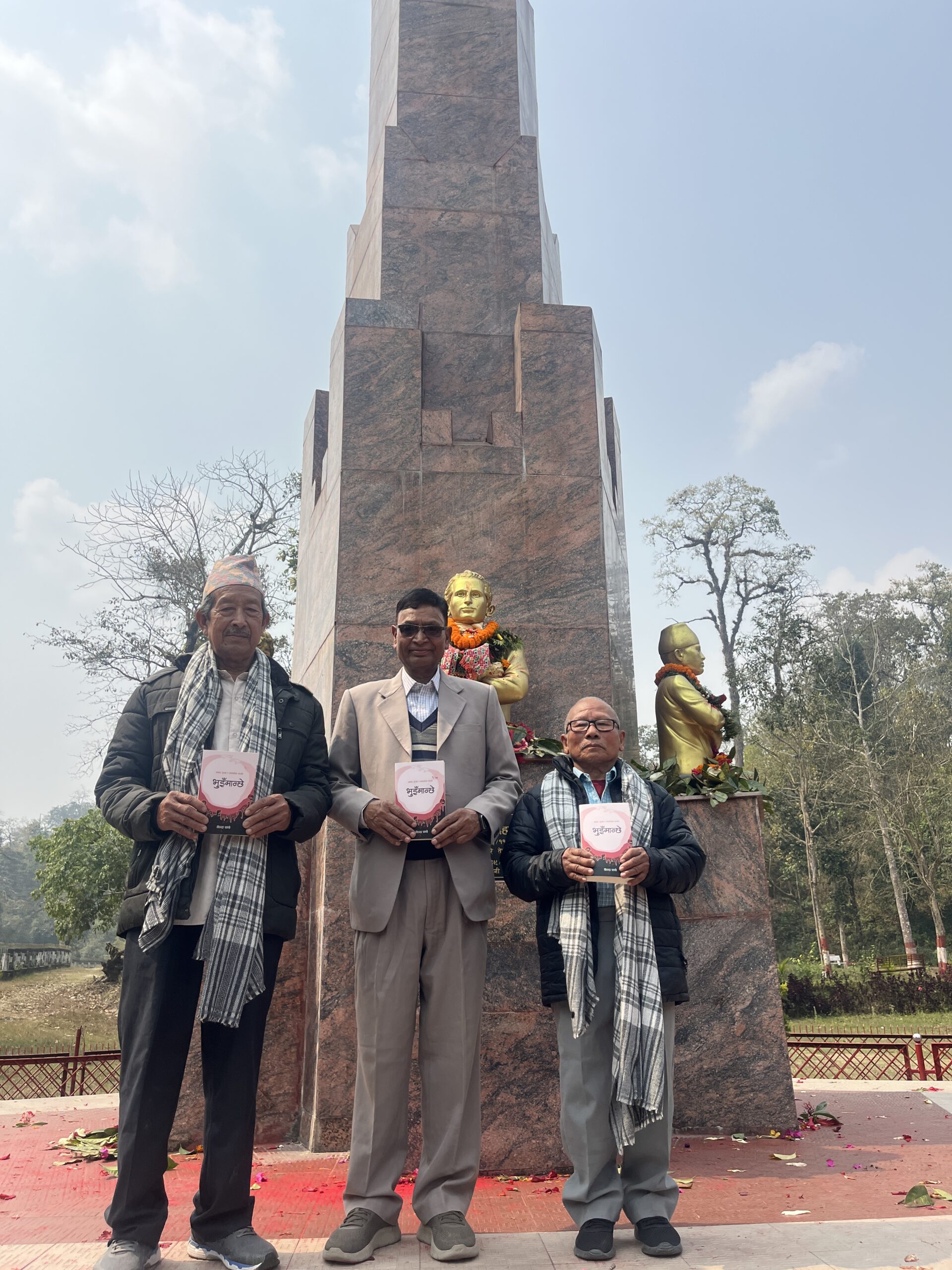The Book Women in Nepali Politics is in market. A discussion on it was conducted on May 31, 2019 in Kathmandu. the gist of the book is as below:
Considering politics as the center of the change process and women as contributors to it, I attempted to explore the nature and process of women empowerment in Nepali political movement from feminist perspective.
In this process, I analyzed women’s role in Nepali democratic movement focusing on the CPN-UML policies and practices in different levels. Being myself as part of the, I used personal reflexivity in interpreting the findings from the field. Similarly, I did interview some of participants, organized focus group discussions with local cadres of CPN-UML and interacted with several other people to get their insight on women empowerment process in the political movement.
From the study, I got insights on women empowerment. Firstly, women empowerment appeared as: (a) familial participation , (b) agitating against oppression, (c) street action for human rights, (d) movement for workers’ rights, and, (e) activism as party-politics. Secondly, I entered into CPN-UML to scrutinize its gender policy and practice of empowering women in different phases. I found that CPN-UML’s policy on women was based on Marxism in the beginning, which was shifted to Marxist feminism in between, and followed the socialist feminism in the later period.
Thirdly, five major gender agendas of CPN-UML after 1990 anticipated the equal rights: (a) descent, (b) ancient property, (c) participation, (d) end of violence against women, and (e) affirmative action which increased the women empowerment in party politics as outcome of a triangular combination of Marxism, Socialist Feminism and International Communist movement. However, I found wide gaps between policy and practice with major challenged of stereotypic mindset and subordination, which debar women’s leadership within the movement.
In conclusion, I understand that political parties needs to (a) make their policy known to members with motivation to enforce effectively, (b) translate gender policy and program into action plan strategically with allocation of relevant resources, (c) timely monitoring to note out of the gaps between policy and practice, (d) periodic revisit policy and improve it; and (e) listen to the grassroots voice and the choices respecting their knowledge and experience in a systematic manner, while implementing its mission of social transformation towards an egalitarian society.
Dr. Bidya Nath Koirala-Prof. of Tribhuvan University
“The book on my eyes”
This book is a blend of activism and academic rigor in writing. It gives feminist and gender look over the communist politics. It also shows the evolvement of communist ideology for transforming the society. At the same time it provides terrain of thoughts to shape and reshape the same ideology. The author has reflected her understanding theoretically and brought women leaders’ understanding to see its connection with the UML policies, strategies, and implementation status. In doing so, the author has challenged the mindset of the male leaders of the same political party. Finally she has come up with different ways to transform the devoted cadres of her political parties into critical mass.
Going through this book, I found the author very bold to review her political party critically; to show the amalgamation of democratic ideals in the authoritative orientation of the communist party under PMPD. Everywhere she is searching for women’s position as a leader, as a cadre, and as user of the communist ideology for social transformation. In this sense this book is worth reading for the students, politicians, academia, and change agents, and people of different mindsets.
Dr. Kyoko Kusakabe- Prof., Dept. Head of Development & Sustainability, AIT, Bangkok, Thailand
This book is very unique. It is a kind of work that can be written only by a person who has gone through the political struggle herself. The rich observation and insights invite the readers to a whole new understanding of the history of women’s political participation in Nepal.
Dr. Meena Acharya- Profound Economist and well-known Feminist
This book, based on her PH.D thesis, Dr. Binda Pandey makes an important contribution to analysis and recording of women’s contribution to the left movement generally and the struggle of the women within that movement to institutionalize feminist concerns. I hope this will encourage similar studies within other parties and generate some knowledge on the subject, about which little is known.
Kamla Bhasin- A renowned Socialist Feminist from the South Asia
Here is a brilliant and much needed socialist feminist analysis of a leading Left Political Party. What makes this book authentic and useful, is the fact that the author has been politically active for almost 40 years at local, national and global levels and is an insider. She has provided a road map for all political parties for removing patriarchal cultures and mindsets and creating gender, caste, class equal, democratic and secular country.
धन्यवाद मन्तव्य
म धन्यवाद दिन उभिएकी छु । यस क्रममा अलिकती यो लेखन यात्राको चर्चा गर्ने अनुमती चाहन्छु ।
२०४८ सालमा नेपालको ट्रेड युनियन आन्दोनलको वारेमा भेटिएसम्मका कुरालाई लिपीवद्ध गर्ने काम जिफण्टले गरेको थियो । २०४९ सालवाट म पनि औपचारिक रुपमा जिफण्टमा जोडिए । त्यसपछि यसका प्रकाशन र गतिविधिलाई भित्रैवाट नियाल्ने क्रममा कौतुहलता जाग्यो, नेपाली श्रमिक आन्दोलनमा महिलाको संलग्नता कस्तो थियो ? नेपाली श्रमिक आन्दोलनको प्रणेता द्धय मनमोहन अधिकारी र गिरिजा प्रसाद कोइरालासंग भेटेर यस विषयमा कुरा भयो । २००३ सालदेखि नै आन्दोलनमा महिलाहरु थिए । त्यतिखेरका आन्दोलनकर्मी महिला वर्मेली टोल विराटनगरतिर अहिले पनि भेटिन सक्छन । यो भनाइले कोतुहलता झनै वढ्यो । खोज कार्य शुरु भयो । २००३ सालमा जेल जानेदेखि २००७ सालमा २७ दिन भोक हड्ताल गर्नेसम्मका गतिविधिको उजागर भयो । २०५६ सालसम्मको श्रमिक आन्दोलनमा महिलाका विषय र सहभागितालाई समेटेर २०५७ मा नेपाली श्रमिक आन्दोलनमा महिला सहभागिता अध्ययन प्रतिवेदनको रुपमा प्रकाशन भयो । यसले मेरो चेतनाको ढोका खोलिदियो, इतिहास कलम चलाउने व्यक्तिको दृष्टिकोण र विवेक अनुसार हुदो रहेछ । आफ्नो इतिहास आफैले खोज्नुपर्दोरहेछ । र, इतिहासको निर्माण मात्र होइन, संरक्षण पनि गर्नुपर्दछ र त्यसको महत्वपुर्ण आधार रहेछ दस्तावेजीकरण ।
२०३७ सालवाट आवद्ध रहेको विद्यार्थी आन्दोलनवाट २०४८ सालमा विदा भए । तर, बहुदलिय व्यवस्थाको शुरु भएपछि पनि महिलाहरु आन्दोलनमा टिक्दैनन भन्ने कुरा बढी सुन्न थालियो । साचो कुरा के हो त भनरे तथ्यगत रुपमा जान्न मन लाग्यो । विद्यार्थी आन्दोलनको शुरुदेखि मुलत म आफै आवद्ध रहेको आन्दोलनले कस्तो नीति बनायो ? कति नेता विकास गर्यो र कति टिके वा किन टिक्न सकेनन भन्ने कुराको खोजि भयो । अखिलको नेतृत्वमा नै महिला कम थिए त निरन्तरतामा समान संख्या कसरी हुन सक्थ्यो र । विद्यार्थी आन्दोलनको नेतृत्वमा पुगेका महिला र पुरुषको निरन्तरताको अनुपातलाई हेर्दा महिलाको निरन्तरता कमजोर छैन भन्ने कुरा तथ्यमा देखियो । तिनै कुराहरु दस्तावेजको रुपमा २०६३ मा आजका युवा विद्यार्थी भोलीका सक्षम जनशक्ति नामको पुस्तक प्रकाशन भयो ।
२०४६ सालमा दलविहिन पंचायती व्यवस्थाको अन्त्य भएर बहुदलिय व्यवस्थाको पुनस्थापना भयो । तर, राजनीतिक आन्दोलनको क्रममा उठान हुदै आएका महिला समानताका विषयहरु २०४७ को संविधानमा समेट्न नेतृत्व सहमत भएन । त्यसपछि पार्टीहरुभित्रै पनि नीति निर्माण तहसम्म नै महिला सहभागिता हुनुपर्ने कुरा उठ्न थाल्यो । यो क्रम विस्तार हुदै गयो । यसैको परिणती थियो २०६३ को संसदवाट पारित प्रस्ताव र संविधानसभामा एकतिहाइ महिला सहभागिता ।
त्यसपछि फेरी कुरा शुरु भयो, संविधानसभामा पुरुष जति आफ्नो पौरखमा आएका र महिलाहरु संवैधानिक वाध्यताले ल्याइएका । कतिपय मेडियाको प्रस्तुती समेत त्यसखालको रहन पुग्यो । पार्टीभित्र पनि यो वहस छदै थियो । यसले मेरो मनमा एउटा प्रश्न जन्मायो – नेपालको राजनीतिक आन्दोलनमा महिलाको भुमिका के रह्यो होला ? महिलाहरु उपलव्धीमा सहभागि भएका हुन वा चुनौतीको सामना गर्दा पनि संगै थिए ? वहसको लागि तथ्यमा उभिनु जरुरी थियो । त्यसको लागि खोजी कार्य इतिहासलाई खोतल्नु जरुरी थियो ।
अर्कातफर्, मेरोे पिएचडीको प्रक्रिया अलपत्र थियो । म नेपालवाट पिएचडी गर्न चाहन्थे । अझ त्रिविवाटै गरौ भनेर २०६० सालमा त्यसको खोजीमा किर्तिपुर पुगे । मलाई माफ गर्नुहोला, त्यहाको आधिकारिक पदाधिकारीको रेस्पोन्स देख्दा नै मैले यता लागेर यो काम पार लाग्दैन भन्ने लाग्यो ।
त्यसपछि विकल्पमा थियो काठमाडौ युनिभिर्सिटी । डा. मन प्रसाद वाग्ले सरलाई भेटेर सम्भावनाको कुरा गरे । उहाले मेरो संलग्नता र क्रियासिलतालाई हेरेर सिधै तपाइले यहा पिएचडी गर्न सक्नुहुन्न । वाहिर जानुस भन्नु भयो । मैले कर गरे मिल्छ वा मिल्दैन चाही भन्नोस सर । वाकी कुरा मलाई छाडिदिनोस । अन्तत उहाले मिल्न त मिल्छ, तर पिएचडी गर्ने कुरालाई सजिलो नठान्नोस भन्ने सुझाव दिनुभयो ।
केयूमा भर्ना भए । क्लास सकियो । थेसिसको तयारी गर्ने समय थियो । आन्दोलनको तयारी गर्नुपर्ने भयो । त्यसपछि संविधानसभा । समयको तारतम्य मिलेन । मन सरले भन्नुभएको कुरा सावित हुने स्थिति बन्यो । केयुको समय माघमा सकियो । संविधानसभा जेठमा । न लेखियो थेसिस, न घोषणा भयो संविधान ।
संविधानसभा विघटनपछि एउटा कार्यक्रममा खाना खाने क्रममा थालिएको अध्ययनको प्रयाश अपुरो रहेको प्रशंग चल्यो । कैलाश सर छेवैमा हुनुहुन्थ्यो । के र कसरी अपुरो भयो भन्ने कुरा विस्तारमा भयो । त्यसपछि रि– एडमिसनको सम्भावना वुझौ न भन्दै उहाले सेतुको भुमिका खेल्नुभयो । काठमाडौ युनिभर्सिटीमा म जस्तै अरु पनि थुप्रै रहेछौ । एकपटकलाई रि– एडमिसन दिने कुरा भएछ । म जस्ता १४ जना विद्यार्थी पुन भर्ना भयौ । प्रोपजल तयारीको समय आयो । पहिलो संविधानसभादेखि बढी पेचिलो बनेको महिला सहभागिता र क्षमता प्रदर्शन । मैले सोचे सरहरुको गायडेन्समा नै यो विषयमा काम गर्न पाए एक काम दुई परिणाम हुने थियो । मैले नेपाली राजनीतिमा महिला सहभागिताको विषय चयन गरे । अनि अध्ययनको विधिका वारेमा “फेमिनिष्ट इन्वाइरी“ । यसको कारण थियो आम रुपमा राजनीतिक बृत्तमा रहेको फेमिनिज्म अर्थात महिलावादप्रतिको नकारात्मक टिप्पणी ।
अव चाहियो सुभरभाइजर । आफुले गाइड गरेको विद्यार्थीले समयमा काम पुरा गर्नुपर्छ भन्ने सोच सवै सुपरभाइजरमा हुनु स्वभाविकै हो । क्लास
प्रिजेन्टेसनमा समेत कतिपय सन्दर्भमा सर मेरो प्रस्तुती पहिला राखिदिनुस ल । मेरो वाहिर जानुपर्ने छ, भन्ने मेरो आग्रह व्यहोर्न वाध्य प्राध्यापकहरुले पुरै थेसिस गाइड गर्ने जिम्मा लिएर सफलतामा पुर्याउनु सहज थिएन । यो चुनौती स्विकारी दिनु भयो विद्यानाथ सरले । मैले भन्ने गर्थे मेरो थेसिस तपाइका लागि पनि चुनौती हुने भयो सर ।
तर, हजारौ विद्यार्थीलाई दायर मेलो लगाइसक्नु भएको सरले यसलाई सहज रुपमा लिनु भयो । कहिले काही म सरका लागि होइन, कि सर मेरा लागि चुनौती बनिदिनु हुन्थ्यो । हप्तौ लगाएर पठाएका दस्तावेज सरले भोलीपल्टै कमेण्ट दिनुहुन्थ्यो । उहाको यो कार्य शैलीले मलाई थप उर्जा दियो । जसकाकारण तोकिएको समयमा नै मेरो लेखन कार्य पुराय भयो । मेरो राजनीतिक संलग्नताका कारण हुन गएको अप्ठेराप्रति विद्या सरले देखाउनु भएको त्यो समझदारीपुर्ण व्यवहारप्रति म संधै अनुग्रहित छु ।
अन्तमा पिएचडि त सकियो, तर यसलाई प्रकाशन गर्ने वा नगर्ने ? कहावाट कसरी गर्ने भन्ने सन्दर्भमा धेरै साथिहरुको सुझाव वाहिरवाट गर्नोस भन्ने नै थियो । तर, यस सम्बन्धि अन्जान रहिरहेको अवस्थामा जोडिन पुग्नुभयो, खड्ग केसी सर र मण्डलाका माधव दाइ । उहाहरुकै प्रयास र समन्वयका कारण आदर्श वुक दिल्लीको प्रकाशनमा आज यो पुस्तक यहाहरको सामु प्रस्तुत गर्न सम्भव भएको छ ।
यस पुस्तकले मुलत अध्ययतालाई दुई कुरामा सहयोग गर्छ भन्ने लाग्छ । एक, महिला सहभागिताको सन्दर्भमा राणा शासनको वेलामा नागरिक तहको आन्दोलनको नेतृत्व योगमायावाट शुरु हुनुको साथै त्यसपछिको राजनीतिका हरेक अप्ठेरा मोडहरुमा महिला अग्रजहरुले देखाउनु भएको साहस र खेल्नुभएको भुमिकाको दस्तावेजीकरण र महिला सहभागिताको वारेमा उठ्ने गरेका प्रश्नलाई तथ्यगत खण्डन । दोस्रो, महिलावादी सोच, एजेण्डा र दृष्टिकोणलाई जसरी आयातित भन्ने रुपमा भन्ने गरिन्थ्यो, यस अध्ययनमा प्राप्त सुचना र तथ्यले भन्छ नेपाली महिलावादी आन्दोलन होमग्रोन अर्थात
यहीको राज्यसत्ता र सामाजिक परिवेसवाट उठेको हो भन्ने कुराको प्रमाण । यस क्रममा केस स्टडीको रुपमा म आफु समेत लामो समयदेखि संलग्न रहदै आएको राजनीतिभित्र महिला सम्बन्धि तय हुदै आएका नीति, गरिएका निर्णय र कार्यान्व्यवनको अवस्थाको विश्लेषणले पनि माथिका यीनै दुई कुरालाई थप पुष्टि गरेको छ भन्ने मेरो वुझाइ रहेको छ ।
यती भनिसकेपछि म आजको यस कार्यक्रममा उत्साहपुर्वक सहभागि भइदिनु भएकोमा सवै प्राध्यापक, वुद्धिजीवी, राजनीतिककमीर्, मेडियाकर्मी, सहकर्मी र विशेष गरी नवयुवाहरुसहित सवै सहभागि महानुभावप्रति हार्दिक धन्यवाद व्यक्त गर्दछु । यस पुस्तकमाथि चर्चा गर्न छोटो समय राखेर गरिएको आग्रहलाई पनि स्विकार गरी आजको यस कार्यक्रममा पुस्तकको वारेमा आफ्ना भनाइहरु राखिदिनु भएकोमा म पाचै जना चर्चाकारज्युहरुप्रति आभारी छु । त्यसैगरी प्रत्यक्ष रुपमा श्रमिक आन्दोलनसंग सम्बन्धित नभए पनि यो पुस्तकको चर्चा कार्यक्रमलाई आयोजना गर्ने जिफण्ट लगायत सम्बद्ध सवै साथिहरुप्रति पुन आभार व्यक्त गर्दछु ।
अन्तमा, लेखन त्यसमा पनि इतिहासमाथि उभिएर लेख्ने काम आफैमा अप्ठेरो र चुनौतीपुर्ण काम हो । त्यसमा पनि एकेडेमिक फ्रेमभित्र रहेर लेख्ने काम अझै जटिल हुदो रहेछ । र, इतिहासको दस्तावेजीकरण जति लेख्दै गया,े त्यति नै अपुरो अनुभुत हुदै जादो रहेछ । यही अनुभुतीका साथ आग्रह गर्न चाहन्छु, यसको नेपाली संस्करण अहिले प्रकाशनको तयारी प्रक्रियामा रहेको छ । अंग्रेजी संस्करणमा समेट्न नसकिएका केही छुट कुराहरुलाई नेपाली संस्करणमा समेट्ने प्रयास भएको छ । यहाहरुले यो पुस्तक हेरिरहदा केही तथ्यगत कमजोरी भेट्नु भएछ भने कम्तिमा पनि यो जेठ महिनाभित्रै जानकारी गराइदिनु भएमा नेपाली संस्करणमा उक्त कमजोरीलाई सच्याउन सकिने कुरा पनि आग्रह गर्न चाहन्छु । र, अन्तमा फेरी एकपटक, सवै सवैमा हार्दिक आभार व्यक्त गर्दै विदा हुन्छु । धन्यवाद ।
२०७६ जेठ १७ गते १४ वजे अल्फा हाउस, वानेश्वर ।





